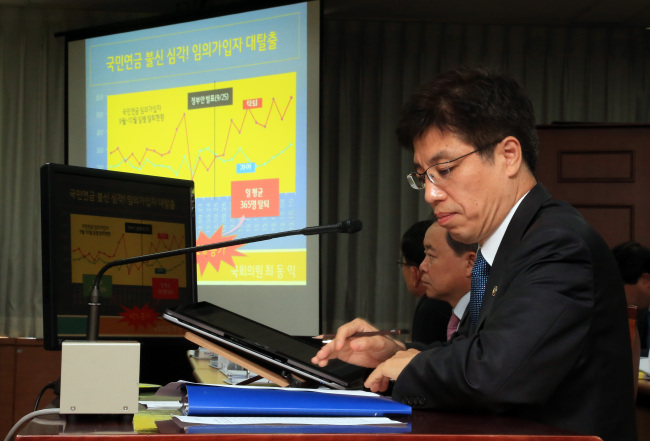The first parliamentary audit of the Park Geun-hye government began Monday with the two rival parties clashing over the president’s scaled back welfare pledges and other contentious issues.
Lawmakers on the National Assembly’s 12 committees grilled government officials on a wide range of issues from controversial history textbooks to the delayed fighter procurement project. For the next 20 days, the ruling and main opposition parties are set to review the operations of a record 630 government bodies and state-run organizations.
Vowing to end political disputes over the spy agency’s alleged election meddling and the controversial transcript of the 2007 inter-Korean summit, the ruling Saenuri Party urged the main opposition Democratic Party to focus on the public’s livelihood during the parliamentary audit.
The DP agreed, but attacked both the ruling party and the Park government for failing to keep the president’s election pledges on welfare.
The party lashed out at the Park government for reneging on her election pledge to provide state subsidies of 200,000 won to all seniors aged 65 and over, regardless of income.
“The then candidate Park gained over 70 percent of senior votes. Everyone knows the election pledge influenced the election result ... To put it bluntly, it was stealing votes or fraud,” Rep. Yang Seung-jo of the DP said.
The Saenuri countered that the downsized plan was a “viable alternative” when considering “budgetary pressure and its sustainability.”
Last month, the Ministry of Health announced a scaled down basic pension plan which promises to dole out between 100,000 and 200,000 won to the poorest 70 percent of seniors aged 65 and older, and according to how much time and money they have invested in the National Pension Service.
DP lawmakers claimed that the Health Ministry was aware that the plan was unfavorable to young NPS subscribers in middle- and lower-income brackets but finalized the plan due to pressure from Cheong Wa Dae.
DP lawmakers also quizzed health ministry officials over resignation of former Health Minister Chin Young, in an apparent move to highlight rumors that he was having trouble with presidential staff over the pension plan.
“The government’s basic pension bill shows that President Park Geun-hye has overturned her election pledge by herself ... the bill will become an evil law that will spark off conflict among people due to the unfair payment system,” Rep. Lee Mok-hee of the DP said. Another DP lawmaker, Rep. Choi Dong-ic, also claimed that the number of NPS subscribers dropping out of the system surged after the government released the plan.
 |
|
Vice Health and Welfare Minister Lee Young-chan reads audit reports released by lawmakers during a parliamentary session held at the ministry’s head office in Seoul on Monday. (Yonhap News) |
In response, Vice Health and Welfare Minister Lee Young-chan said the government will make sure that there will be no NPS subscribers disadvantaged from the new basic pension plan.
Lawmakers criticized the central government for having trouble securing funds for other major welfare programs, such as free child care and full medical coverage for patients with four major diseases, and demanded countermeasures to offer bigger welfare benefits as promised.
More than 3 trillion won of the government’s welfare budget was wasted every year due to lax management, Rep. Shin Eui-jin of the Saenuri Party said.
Meanwhile, Rep. Ahn Cheol-soo, former presidential candidate, said in his first audit report on the Health and Welfare Committee that the government had spent less than half the funds it had vowed to spend to improve the state health insurance coverage for the last five years.
The government had previously said it secured 3 trillion won to increase medical coverage but spent only 1.7 trillion won, he said.
By Cho Chung-un (christory@heraldcorp.com)